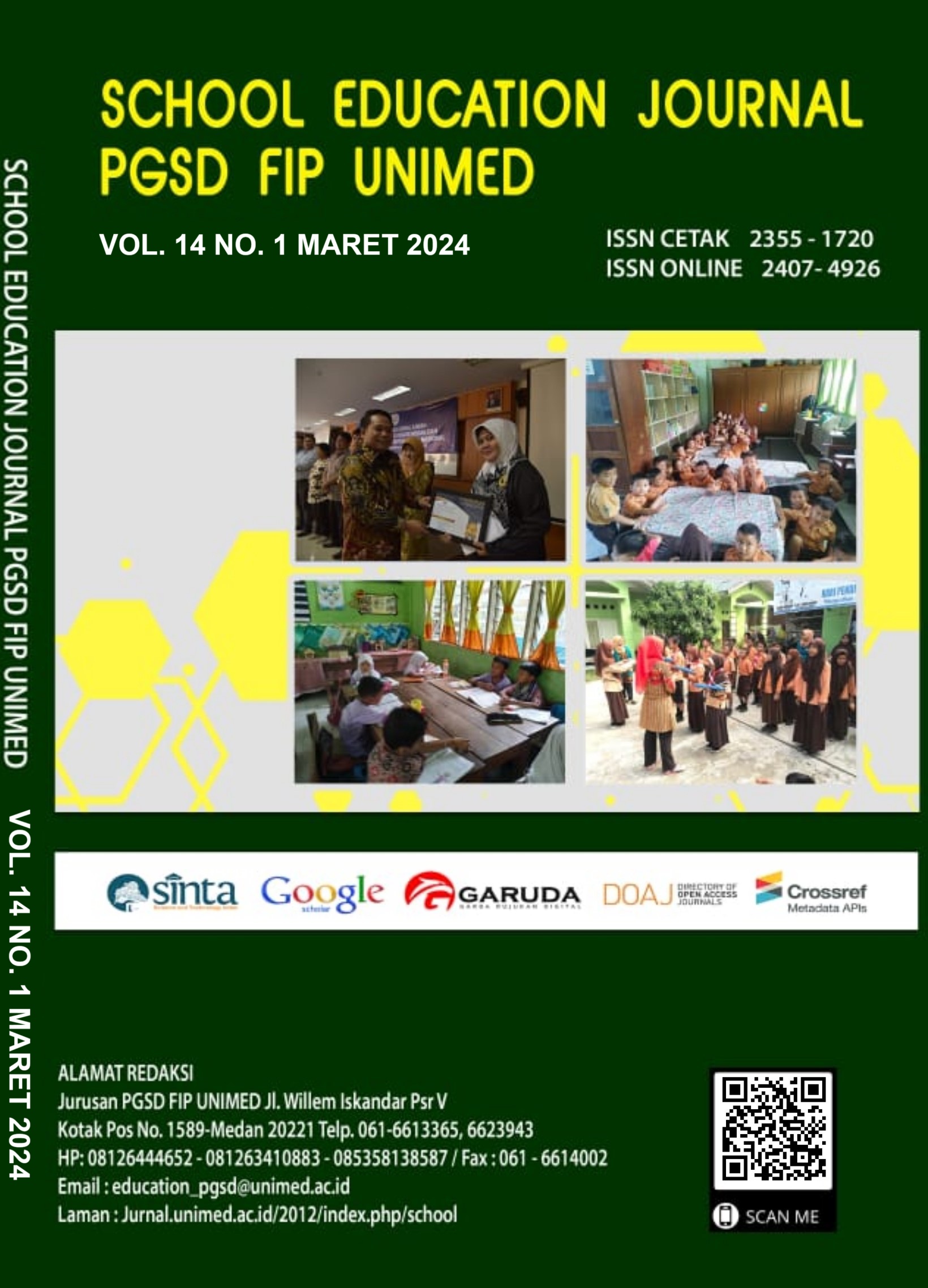EVALUASI PROGRAM BESTRA (BERSIH “ SOPAN “ TERTIB “ RAPI “ AMAN) DI SEKOLAH DASAR DENGAN MENGGUNAKAN MODEL GOAL FREE EVALUATION
DOI:
https://doi.org/10.24114/sejpgsd.v14i1.57970Keywords:
Evaluation, BeSTRA Program, Goal Free Evaluation, SD Kristen Lentera AmbarawaAbstract
This study aims to evaluate the BeSTRA program at SD Kristen Lentera Ambarawa using a goal-free evaluation model. This research uses a qualitative approach with an evaluation method. Data collection techniques use document studies, observations, and interviews. The subjects of the study data included the principal, the vice principal for student affairs, three teachers, and fifteen students in grades 4, 5, and 6. Data analysis techniques use the Miles and Huberman model which includes data reduction, data presentation, and conclusions. The results showed that the planning and implementation of the BeSTRA program were by the BeSTRA cultural guidelines at Lentera Ambarawa Christian Elementary School for the 2023/2024 academic year. The supporting factors of the BeSTRA program are cooperation between school residents and the habituation of the BeSTRA program implementation schedule. The positive impact of the BeSTRA program is to form a clean, polite, orderly, neat, and safe character in students as a habit or habit in everyday life, and create a clean and comfortable environment to live in. However, on the other hand, there are inhibiting factors that become obstacles to the BeSTRA program, namely the lack of time and responsibility of students in implementing the BeSTRA program in schools.References
Anastasya, E., & Dewi, D. A. (2021). Mata Pelajaran Pendidikan Kewarganegaraan Sebagai Pendidikan Karakter Peserta Didik Sekolah Dasar. Jurnal Pendidikan Kewarganegaraan Undiksha, 9(2), 291-304.
Arsyam, M., & Tahir, M. Y. (2021). Ragam Jenis Penelitian dan Perspektif. Al-Ubudiyah: Jurnal Pendidikan dan Studi Islam, 2(1), 37-47.
Djuanda, I. (2020). Implementasi Evaluasi Program Pendidikan Karakter Model CIPP (Context, Input, Process dan Output). Al Amin: Jurnal Kajian Ilmu dan Budaya Islam, 3(01), 37-53.
Indonesia, P. R. (2017). Peraturan Presiden 87 Tahun 2017 tentang Penguatan Pendidikan Karakter. Jakarta.
Indonesia, P. R. (2017). Peraturan Presiden Republik Indonesia Nomor 87 Tahun 2017 Tentang Penguatan Pendidikan Karakter. Jakarta.
Jaelani, A., & Asvio, N. (2019). Evaluasi Program Pendidikan Karakter di Sekolah Dasar. Prosiding Seminar Nasional Program Pascasarjana Universitas PGRI Palembang, (Vol. 12, No. 01).
Mustafa, P. S. (2021). Model Discrepancy sebagai Evaluasi Program Pendidikan. PALAPA, 9(1), 182-198.
Natalini, B., & Hardini, A. A. (2020). Implementasi Program Pendidikan Karakter Di SD Kanisius GendonganSalatiga. JRPD (Jurnal Riset Pendidikan Dasar), 3(1), 77-86.
Rusnaini, R., Suryaningsih, A., & Noventari, W. (2021). Intensifikasi Profil Pelajar Pancasila dan Implikasinya Terhadap Ketahanan Pribadi Siswa. Jurnal Ketahanan Nasional, 27(2), 230-249.
Safitri, A., Wulandari, D., & Herlambang, Y. (2022). Proyek Penguatan Profil Pelajar Pancasila: Sebuah Orientasi Baru Pendidikan dalam Meningkatkan Karakter Siswa Indonesia. Jurnal Basicedu, 6(4), 7076-7086.
Sugiyono. (2015). Metode Penelitian Manajemen. Bandung: Alfabeta.
Taunu, S. E., & Iriani, A. (2019). Evaluasi Program Penguatan Pendidikan Karakter Terintegrasi Mata Pelajaran Matematika di SMP Negeri. Kelola: Jurnal Manajemen Pendidikan, 6(1), 64-73.
Wardani, H. K., Darusuprapti, F., & Hajaroh, M. (2022). Model-Model Evaluasi Pendidikan Dasar (Scriven Model, Tyler Model, dan Goal Free Evaluation). Jurnal Pendidikan: Riset dan Konseptual, 6(1), 36-49.
Downloads
Published
Issue
Section
License
Authors whose manuscripts are approved are approved as follows:
The publication rights for all journal manuscript materials published/published on the SEJ (School Education Journal) E-Journal site are held by the editorial board with the author's knowledge (moral rights remain with the manuscript authors).
The formal legal requirements for accessing this electronic digital journal article are subject to the terms of the Creative Commons Attribution-ShareAlike (CC BY) license, which means that E-Journal SEJ (School Education Journal) has the right to store, transfer media/format, manage in the form of a database, maintain, and publish articles without asking permission from the author as long as the author's name remains as the copyright owner.
Manuscripts published/published electronically are open access for educational, research, and library purposes.

